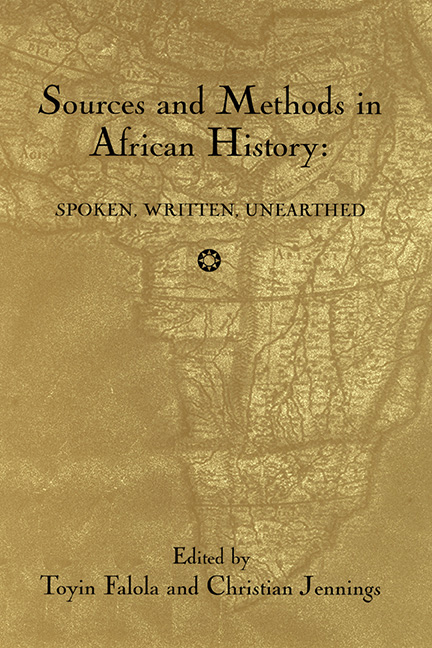Book contents
- Frontmatter
- Dedication
- Contents
- Acknowledgments
- Introduction
- Part I Archaeological Sources
- Part II Africa and the Atlantic World
- Part III Documentary Sources
- Part IV Oral Tradition
- 14 Section Introduction: Oral Tradition: Classic Questions, New Answers
- 15 Narratives on Pilgrimages to Mecca: Beauty versus History in Mande Oral Tradition
- 16 Kingship and the Mediators of the Past: Oral Tradition and Ritual Performance in Nupeland, Nigeria
- 17 Passages in a Struggle over the Past: Stories of Maji Maji in Njombe, Tanzania
- 18 Maisha: Life History and the History of Livelihood along the TAZARA Railway in Tanzania
- Part V Innovative Sources and Methods
- Contributors
- Index
18 - Maisha: Life History and the History of Livelihood along the TAZARA Railway in Tanzania
from Part IV - Oral Tradition
Published online by Cambridge University Press: 25 October 2017
- Frontmatter
- Dedication
- Contents
- Acknowledgments
- Introduction
- Part I Archaeological Sources
- Part II Africa and the Atlantic World
- Part III Documentary Sources
- Part IV Oral Tradition
- 14 Section Introduction: Oral Tradition: Classic Questions, New Answers
- 15 Narratives on Pilgrimages to Mecca: Beauty versus History in Mande Oral Tradition
- 16 Kingship and the Mediators of the Past: Oral Tradition and Ritual Performance in Nupeland, Nigeria
- 17 Passages in a Struggle over the Past: Stories of Maji Maji in Njombe, Tanzania
- 18 Maisha: Life History and the History of Livelihood along the TAZARA Railway in Tanzania
- Part V Innovative Sources and Methods
- Contributors
- Index
Summary
Introduction
In the spring of 2000, I began to carry out field research on the rural history of the TAZARA railway in southern Tanzania. My goal was to learn how the railway had affected the lives of the people who lived along the railway corridor, particularly in those areas of southern Tanzania that had been isolated and without transportation before TAZARA was built. My focus was on the “ordinary train”—the train that stops at every small station along the railway, and serves as a lifeline for small-scale trade and economic development in the region. I wanted to use the “ordinary” train (rather than the “express” train) as a starting point for my investigation of TAZARA's impact on everyday life.
I found that there were very few records or other written documents that could tell me much about the ordinary train or about everyday economic activity in the small stations and their surrounding villages. Most of the focus of TAZARA administrative records was on larger-scale international trade between Zambia and the port of Dar es Salaam. Data on local traffic was aggregated in ways that made it difficult to learn much about local use of the railway and its relationship to local development.
My research strategy, therefore, was twofold. I began to develop a database of parcel receipts, the documents that are generated each time a passenger takes a small load of goods on the train. At the same time, I began to interview local traders, farmers, fishermen, livestock herders, woodcutters, and others about their economic activities and how they had changed since the arrival of TAZARA. I had developed a simple, unstructured interview questionnaire that I hoped would get people talking about the role of TAZARA in their lives and communities. After my first set of interviews, however, I began to doubt whether this approach was going to help me to learn very much. My questionnaire about the railway had the opposite effect of what I had hoped. Rather than stimulating talk, my questions seemed to make people uncomfortable, confused, and eventually silent. Fortunately, early on in my research I began an interview with a market woman that evolved into a discussion of her life story.
- Type
- Chapter
- Information
- Sources and Methods in African HistorySpoken Written Unearthed, pp. 312 - 328Publisher: Boydell & BrewerPrint publication year: 2003



